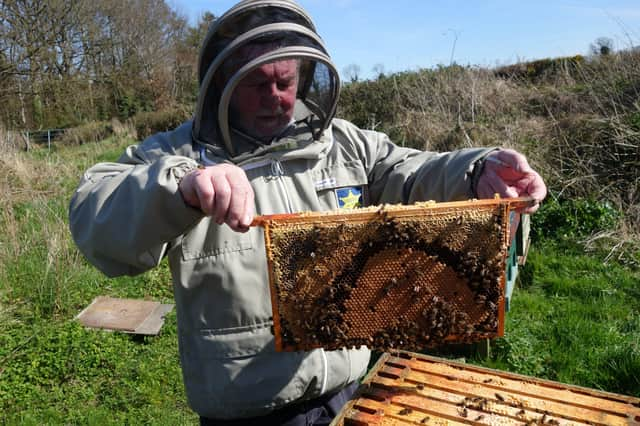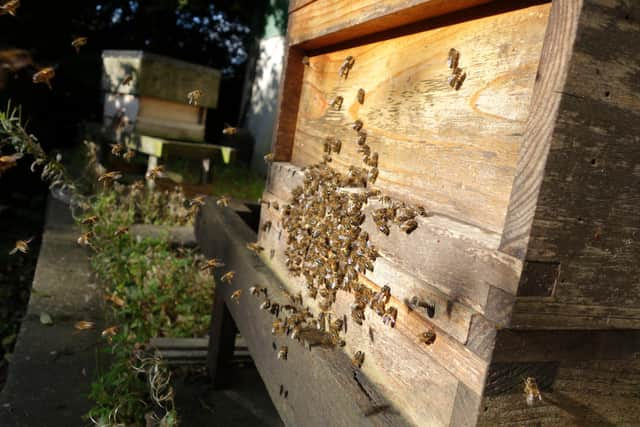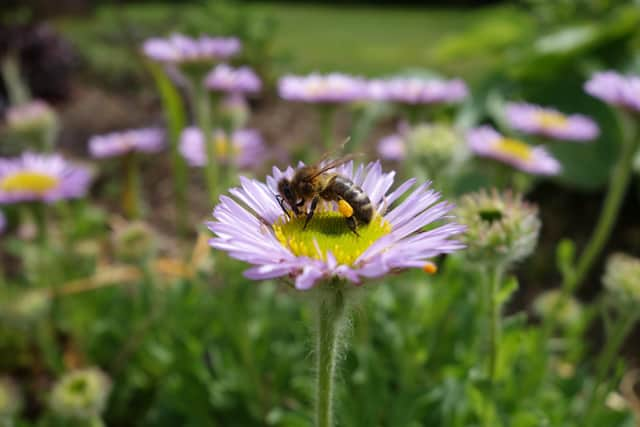Honey producers stung by potential Protocol threat


Leading beekeepers here have warned the Northern Ireland Assembly and the Department of Agriculture, Environment and Rural Affairs (DAERA) in particular that the importation of large numbers of bees from Italy possibly as a staging post to Great Britain could “threaten the established and unique genetics of local honeybees”.
Dr John Hill, Ulster Beekeepers Association (UKBA) chairman, and Gail Orr, treasurer of the Institute of Northern Ireland Beekeepers, local producers of premium quality honey, have called on DAERA for measures to protect our “internationally significant reserve of pure Dark European Honeybees.”
Advertisement
Hide AdAdvertisement
Hide AdThey have also launched a parliamentary petition which urges the UK Government to protect the bee industry from any possible pests or other threats from any importation of EU bees.


Guided by principles of sustainability and good husbandry, local honey is an entirely natural product from nectar foraged from blossoms in the fields, hedgerows, orchards and woodlands, then harvested by hand. Honeybees help pollinate a range of crops including Armagh’s famed apples for cider, juice and other foods.
Honeybees are recognised as the world’s most important pollinator of food crops including vegetables and fruit. They also pollinate clover and alfalfa for feeding to cattle, so there are implications for the meat and dairy industry which are vitally important to the local economy.
John and Gail explain: “Local beekeeping associations have worked to establish voluntary conservation areas in support of the black bee. We are concerned that imported packages of honeybees from Italy are of completely different strains and will be present at a time when local honey bee colonies are starting to breed.
Advertisement
Hide AdAdvertisement
Hide Ad“Aside from potential risks posed by pests and disease, the presence of large volumes of free flying Italian sourced bees could have a negative impact on the genetics, temperament and population dynamics of the local honey bee, undoing in one stroke the work of generations to preserve a strain of bee suited to our climate.


“Beekeeping and honey production here is largely a low volume, low intensity and artisanal craft. It is more about husbandry than exploitation. It provides some of the best honey for consumption anywhere. It is a craft that supports farmers and growers. It is a craft that we must protect for future generations,” they add in their impassioned plea to the department.
The problem is the outcome of Brexit which meant it is no longer possible to import honeybees from an EU country directly into Great Britain. Honeybees can, however, be imported directly into Northern Ireland due to our continuing position within the EU.
“Once here, it would seem that those same honeybees can then be exported to Britain - importation by the back door,” they add.
Advertisement
Hide AdAdvertisement
Hide AdHoneybee imports into or through Northern Ireland had been minimal in the past.
“This has reduced exposure to potential threats from invasive pests and diseases. Prior to Brexit, honeybees were imported in large numbers from regions in Italy such as Puglia to Great Britain. It is thus of great worry that the Puglia region from which honeybees are sourced is close to areas that have experienced outbreaks of a hugely serious threat to honeybees: the Small Hive Beetle (SHB).
“SHB is a pest that destroys colonies of bees. Recorded outbreaks of SHB in 2020 were sufficiently close to Puglia to raise the genuine and realistic concern that importation of bees from that region will bring SHB to Northern Ireland,” they warn.
They also express concern about the possibility of large consignments of millions of honeybees from Italy being imported at a critical time for local bees and for honey production here.
Advertisement
Hide AdAdvertisement
Hide Ad“SHB would have a devastating effect on wild bees and managed bees across the island of Ireland and throughout England, Scotland and Wales. SHB arrived in Florida in 1998 and within two years it destroyed 20 000 colonies of honeybees. It has since moved on to Canada. SHB has the potential to destroy beekeeping in Ireland. We must do all that we can to prevent this,” they say.
They are concerned, furthermore, about other potential threats to local honeybees including an “unsustainable demand on food for local bees”. Existing colonies of honeybees cared for by “dedicated, artisanal beekeepers” here could also suffer.
“Other pollinating insects, including endangered solitary bees and bumble bees, could be significantly threatened, suffering from inconsiderate and needless overstocking of honeybees.”
They hope that “ministers and departments will not sit back but will act now to preserve and protect beekeeping in Northern Ireland.”
A message from the Editor:
Advertisement
Hide AdAdvertisement
Hide AdThank you for reading this story on our website. While I have your attention, I also have an important request to make of you.
In order for us to continue to provide high quality and trusted local news on this free-to-read site, I am asking you to also please purchase a copy of our newspaper whenever you are able to do so.
Our journalists are highly trained and our content is independently regulated by IPSO to some of the most rigorous standards in the world. But being your eyes and ears comes at a price. So we need your support more than ever to buy our newspapers during this crisis.
With the coronavirus lockdown having a major impact on many of our local valued advertisers - and consequently the advertising that we receive - we are more reliant than ever on you helping us to provide you with news and information by buying a copy of our newspaper when you can safely.
Advertisement
Hide AdAdvertisement
Hide AdYou can also enjoy unlimited access to the best news from across Northern Ireland and the UK by subscribing to newsletter.co.uk
With a digital subscription, you can read more than five articles, see fewer ads, enjoy faster load times, and get access to exclusive newsletters and content. Visit https://www.newsletter.co.uk/subscriptions now to sign up.
Thank you